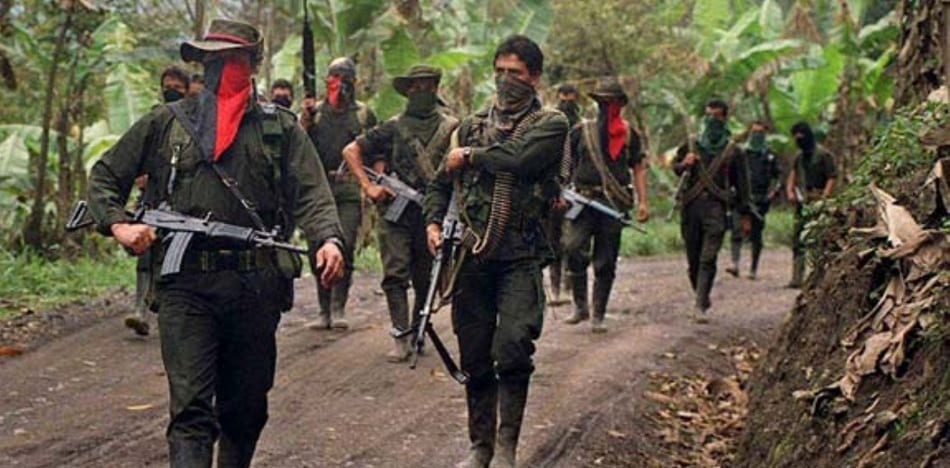
Spanish – In communities across Colombia, armed groups have violently enforced their own measures to prevent the spread of COVID-19,” said José Miguel Vivanco, Americas director at Human Rights Watch. “This abusive social control reflects the government’s long-standing failure to establish a meaningful state presence in remote areas of the country, including to protect at-risk populations,” he added.
En Colombia, grupos armados han impuesto toques de queda, cuarentenas y otras medidas contra el covid-19.
Las infracciones se castigan con asesinatos y ataques.
Documentamos la situación en 11 departamentos del país.
Nuevo informe de @hrw_espanol: https://t.co/xCEiiatdf5
— José Miguel Vivanco (@JMVivancoHRW) July 15, 2020
Between March and June 2020, HRW conducted telephone interviews with 55 people in 13 departments in Colombia, including community leaders, prosecutors, humanitarian organizations staff, police, and local residents.
HRW’s research concluded that in at least 11 municipalities in Colombia, armed groups have been imposing rules on local populations to control the spread of COVID-19. The departments where HRW identified such activities were Arauca, Bolivar, Caqueta, Cauca, Choco, Córdoba, Guaviare, Huila, Nariño, Norte de Santander, and Putumayo. In at least five of these departments, groups used violence to enforce their rules, and in at least four others, they threatened to use violence to achieve compliance.
The killings have been carried out by several groups, including the “dissidents” of the Revolutionary Armed Forces of Colombia (Farc), the National Liberation Army (ELN), and the Gaitanist Self-Defence Forces of Colombia, also known as the Clan del Golfo.
Pamphlet distribution
HRW identified 20 pamphlets distributed by the armed groups. In Bolívar, members of the ELN issued a pamphlet in early April announcing that they were “forced to kill people to preserve lives” because the population had not “respected the orders to prevent COVID-19.” The pamphlet states that “only people working in food stores, bakeries, and pharmacies can work,” and clarifies that other people must stay inside their homes. Armed groups have also spread these messages to communities through WhatsApp messages. Some groups have organized meetings with the residents to inform them about the rules imposed in the area, according to human rights officials.
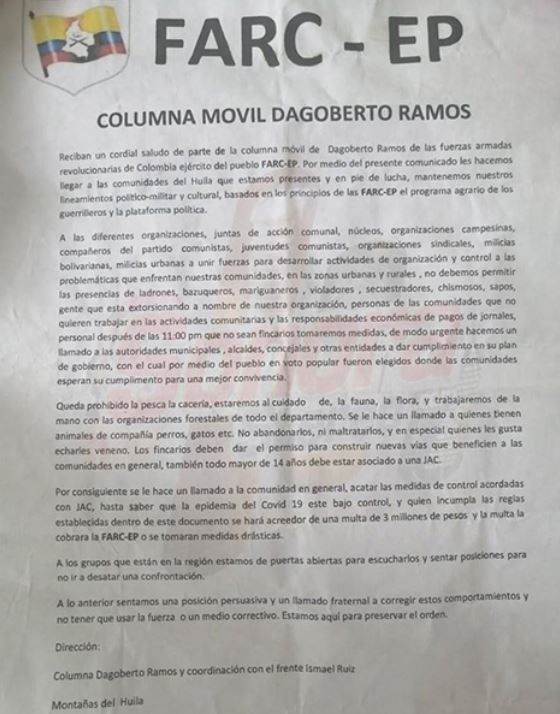
In early April, the ELN distributed a pamphlet in the department of Chocó listing eight rules. These include “total closure of the roads”, the prohibition of “any type of public events and meetings” with more than ten people, a curfew from 8 p.m. to 6 a.m., and obligatory isolation of people arriving in the area.
The Carolina Ramírez Front distributed a pamphlet in Putumayo announcing that because of COVID-19, it was “totally forbidden to transit after 7 at night except for sick people.” The pamphlet also indicated that “only the previously authorized entry and exit of boats is allowed.” Those who do not comply with this rule must pay a “fine” equivalent to 2,000,000 pesos (about 550 USD).
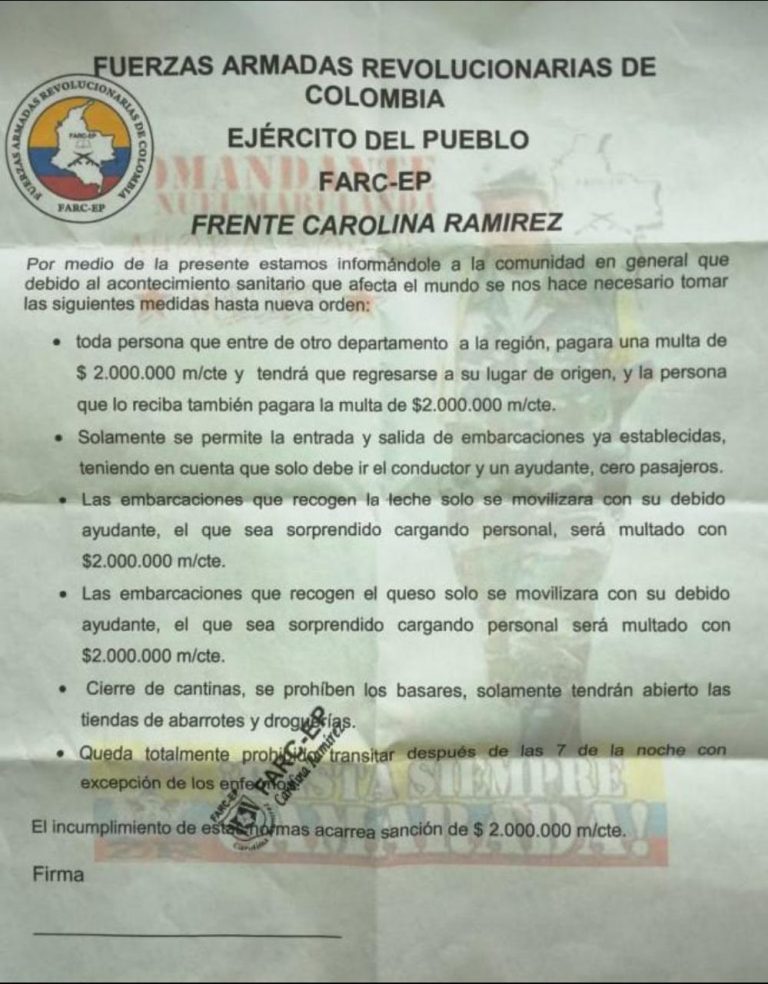
Curfews
While the government has allowed stores selling food, medicine, and other basic supplies to remain open, in Tumaco, armed groups have demanded that owners keep their businesses closed, community leaders said. The government allows people to leave their homes to access health services or banks, as well as in other cases of serious need, even during curfew hours. However, HRW reports that in parts of Nariño, Arauca, Putumayo, and Guaviare, people, including the sick, have not been allowed to leave their homes during the quarantine.
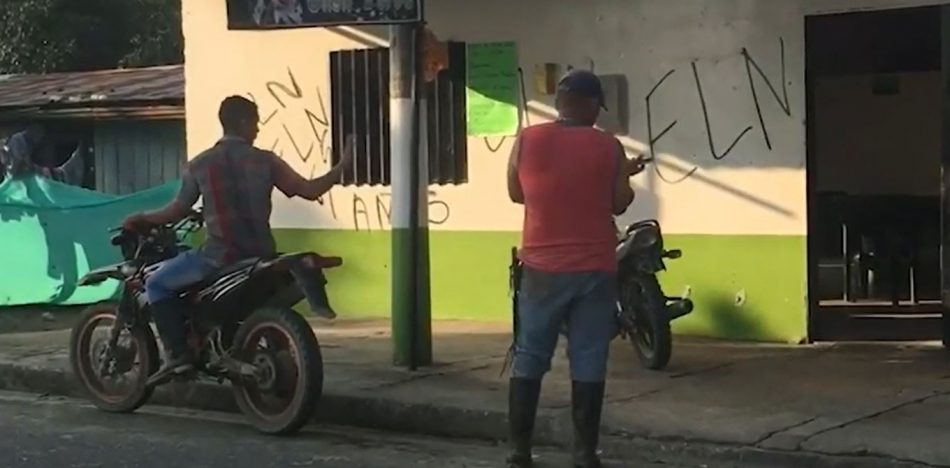
In Norte de Santander, the People’s Liberation Army (EPL) “invited” people to comply with the measures and stated that its members would “contribute to control compliance.”
The armed groups do not hesitate to resort to homicide to enforce their laws. In Nariño, on April 4, armed men shot at a private vehicle on the road between Barbacoas and Tumaco. Four people were in the vehicle, including a sick passenger and a paramedic. The car bore a flag that is commonly used in Colombia to identify vehicles on a “medical mission.” Two of the passengers died, and two others were injured.
The attack was perpetrated by members of the armed group Los Contadores, which is involved in drug trafficking networks in the region. Judicial officials and humanitarian workers who analyzed the case say the armed group carried out the attack to enforce their order that residents should not leave their homes after 6 p.m.
Community forced to install checkpoints
In Guaviare and Putumayo, FARC “dissidents” have established checkpoints and often force communities to control access by outsiders. A community leader from Guaviare described the social control exercised by the 1st Front:
“They’re in charge here and we have to obey them…. They order us to put checkpoints on roads; they order they do not want to see anyone on the roads when it gets dark, that whoever moves when it is forbidden must be punished for disobeying…. They say they do this to prevent the virus from reaching us, but they have always imposed their measures for social and territorial control…. We pay attention to them because otherwise they can harm us or harm our families…. No one is going to protect us here.”
Murder as a deterrent
On April 4, the farmer José Rubiel Muñoz Samboní was murdered in the village of La Medina after he arrived from a nearby community to meet with friends. A prosecutor who examined the case and the Ombudsman’s Office believe that he was killed by members of the ELN because he did not comply with the confinement dictated by this group.
On April 26, members of the Jaime Martínez Mobile Column, a group that emerged from the FARC demobilization, killed Armando Montaño, Weimar Arará, and Humberto Solís, and injured four other civilians in the department of Cauca. The victims were attacked in a public park, a prosecutor, and an official from the Ombudsman’s Office who investigated the case told HRW. The prosecutor said they had evidence that the civilians were killed for not complying with the isolation measures imposed by the armed group. The dissidents had warned the victims that they would be killed if they did not comply, the prosecutor said.
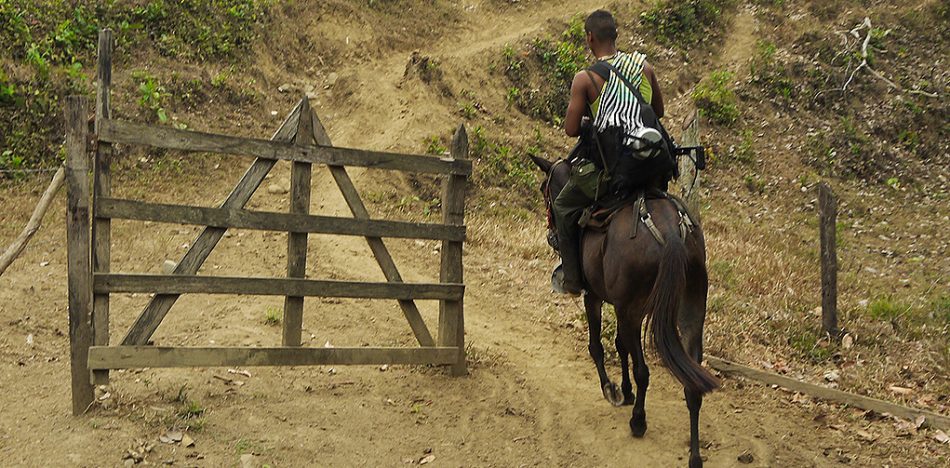
Community leader Edison León Pérez condemned the excesses by the armed groups in the rural areas of the municipality of San Miguel, which included the establishment of illegal checkpoints where they prevented sick people from entering the area’s hospital:
“As you are aware, a health checkpoint has been established by the communities (and)… imposed by the narcotrafficking group that operates in the region, where communities … are forced to have personnel 24-hours (a day) without any protection … (potentially) exposing us to COVID-19.… Many sick people are not allowed to cross (the checkpoint), but people authorized by the narco group face no problems… Mr. Mayor, as the president of the Neighborhood Action Committee … I am not willing to continue sending my people to death.”
On June 8, “dissidents” of the 48th Front of the FARC murdered León Pérez in cold blood. His assassins remain unpunished, and the terrorists still have an iron grip on the municipality of San Miguel.
 Versión Español
Versión Español












